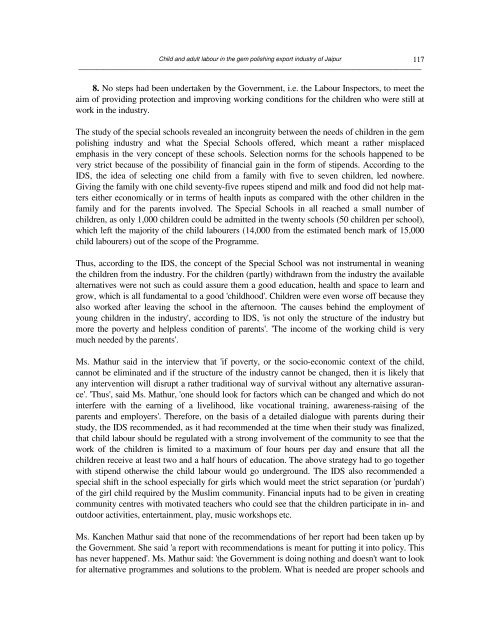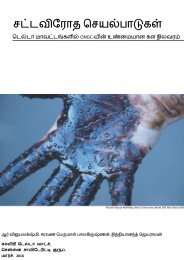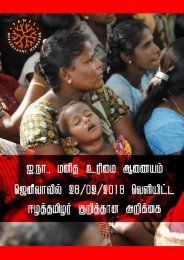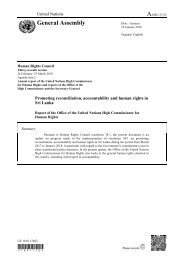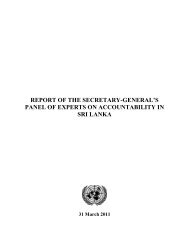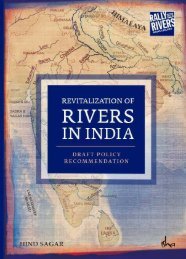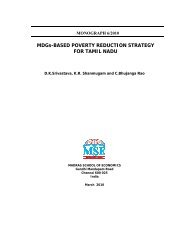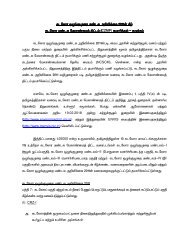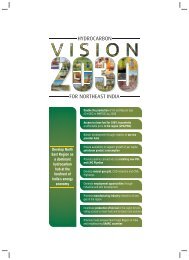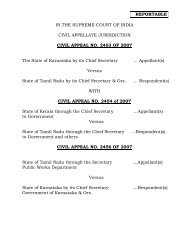You also want an ePaper? Increase the reach of your titles
YUMPU automatically turns print PDFs into web optimized ePapers that Google loves.
<strong>Child</strong> <strong>and</strong> <strong>adult</strong> <strong>labour</strong> <strong>in</strong> <strong>the</strong> <strong>gem</strong> polish<strong>in</strong>g <strong>export</strong> <strong>in</strong>dustry <strong>of</strong> Jaipur<br />
──────────────────────────────────────────────────────────────────────────────────────────────<br />
8. No steps had been undertaken by <strong>the</strong> Government, i.e. <strong>the</strong> Labour Inspectors, to meet <strong>the</strong><br />
aim <strong>of</strong> provid<strong>in</strong>g protection <strong>and</strong> improv<strong>in</strong>g work<strong>in</strong>g conditions for <strong>the</strong> children who were still at<br />
work <strong>in</strong> <strong>the</strong> <strong>in</strong>dustry.<br />
The study <strong>of</strong> <strong>the</strong> special schools revealed an <strong>in</strong>congruity between <strong>the</strong> needs <strong>of</strong> children <strong>in</strong> <strong>the</strong> <strong>gem</strong><br />
polish<strong>in</strong>g <strong>in</strong>dustry <strong>and</strong> what <strong>the</strong> Special Schools <strong>of</strong>fered, which meant a ra<strong>the</strong>r misplaced<br />
emphasis <strong>in</strong> <strong>the</strong> very concept <strong>of</strong> <strong>the</strong>se schools. Selection norms for <strong>the</strong> schools happened to be<br />
very strict because <strong>of</strong> <strong>the</strong> possibility <strong>of</strong> f<strong>in</strong>ancial ga<strong>in</strong> <strong>in</strong> <strong>the</strong> form <strong>of</strong> stipends. Accord<strong>in</strong>g to <strong>the</strong><br />
IDS, <strong>the</strong> idea <strong>of</strong> select<strong>in</strong>g one child from a family with five to seven children, led nowhere.<br />
Giv<strong>in</strong>g <strong>the</strong> family with one child seventy-five rupees stipend <strong>and</strong> milk <strong>and</strong> food did not help matters<br />
ei<strong>the</strong>r economically or <strong>in</strong> terms <strong>of</strong> health <strong>in</strong>puts as compared with <strong>the</strong> o<strong>the</strong>r children <strong>in</strong> <strong>the</strong><br />
family <strong>and</strong> for <strong>the</strong> parents <strong>in</strong>volved. The Special Schools <strong>in</strong> all reached a small number <strong>of</strong><br />
children, as only 1,000 children could be admitted <strong>in</strong> <strong>the</strong> twenty schools (50 children per school),<br />
which left <strong>the</strong> majority <strong>of</strong> <strong>the</strong> child <strong>labour</strong>ers (14,000 from <strong>the</strong> estimated bench mark <strong>of</strong> 15,000<br />
child <strong>labour</strong>ers) out <strong>of</strong> <strong>the</strong> scope <strong>of</strong> <strong>the</strong> Programme.<br />
Thus, accord<strong>in</strong>g to <strong>the</strong> IDS, <strong>the</strong> concept <strong>of</strong> <strong>the</strong> Special School was not <strong>in</strong>strumental <strong>in</strong> wean<strong>in</strong>g<br />
<strong>the</strong> children from <strong>the</strong> <strong>in</strong>dustry. For <strong>the</strong> children (partly) withdrawn from <strong>the</strong> <strong>in</strong>dustry <strong>the</strong> available<br />
alternatives were not such as could assure <strong>the</strong>m a good education, health <strong>and</strong> space to learn <strong>and</strong><br />
grow, which is all fundamental to a good 'childhood'. <strong>Child</strong>ren were even worse <strong>of</strong>f because <strong>the</strong>y<br />
also worked after leav<strong>in</strong>g <strong>the</strong> school <strong>in</strong> <strong>the</strong> afternoon. 'The causes beh<strong>in</strong>d <strong>the</strong> employment <strong>of</strong><br />
young children <strong>in</strong> <strong>the</strong> <strong>in</strong>dustry', accord<strong>in</strong>g to IDS, 'is not only <strong>the</strong> structure <strong>of</strong> <strong>the</strong> <strong>in</strong>dustry but<br />
more <strong>the</strong> poverty <strong>and</strong> helpless condition <strong>of</strong> parents'. 'The <strong>in</strong>come <strong>of</strong> <strong>the</strong> work<strong>in</strong>g child is very<br />
much needed by <strong>the</strong> parents'.<br />
Ms. Mathur said <strong>in</strong> <strong>the</strong> <strong>in</strong>terview that 'if poverty, or <strong>the</strong> socio-economic context <strong>of</strong> <strong>the</strong> child,<br />
cannot be elim<strong>in</strong>ated <strong>and</strong> if <strong>the</strong> structure <strong>of</strong> <strong>the</strong> <strong>in</strong>dustry cannot be changed, <strong>the</strong>n it is likely that<br />
any <strong>in</strong>tervention will disrupt a ra<strong>the</strong>r traditional way <strong>of</strong> survival without any alternative assurance'.<br />
'Thus', said Ms. Mathur, 'one should look for factors which can be changed <strong>and</strong> which do not<br />
<strong>in</strong>terfere with <strong>the</strong> earn<strong>in</strong>g <strong>of</strong> a livelihood, like vocational tra<strong>in</strong><strong>in</strong>g, awareness-rais<strong>in</strong>g <strong>of</strong> <strong>the</strong><br />
parents <strong>and</strong> employers'. Therefore, on <strong>the</strong> basis <strong>of</strong> a detailed dialogue with parents dur<strong>in</strong>g <strong>the</strong>ir<br />
study, <strong>the</strong> IDS recommended, as it had recommended at <strong>the</strong> time when <strong>the</strong>ir study was f<strong>in</strong>alized,<br />
that child <strong>labour</strong> should be regulated with a strong <strong>in</strong>volvement <strong>of</strong> <strong>the</strong> community to see that <strong>the</strong><br />
work <strong>of</strong> <strong>the</strong> children is limited to a maximum <strong>of</strong> four hours per day <strong>and</strong> ensure that all <strong>the</strong><br />
children receive at least two <strong>and</strong> a half hours <strong>of</strong> education. The above strategy had to go toge<strong>the</strong>r<br />
with stipend o<strong>the</strong>rwise <strong>the</strong> child <strong>labour</strong> would go underground. The IDS also recommended a<br />
special shift <strong>in</strong> <strong>the</strong> school especially for girls which would meet <strong>the</strong> strict separation (or 'purdah')<br />
<strong>of</strong> <strong>the</strong> girl child required by <strong>the</strong> Muslim community. F<strong>in</strong>ancial <strong>in</strong>puts had to be given <strong>in</strong> creat<strong>in</strong>g<br />
community centres with motivated teachers who could see that <strong>the</strong> children participate <strong>in</strong> <strong>in</strong>- <strong>and</strong><br />
outdoor activities, enterta<strong>in</strong>ment, play, music workshops etc.<br />
Ms. Kanchen Mathur said that none <strong>of</strong> <strong>the</strong> recommendations <strong>of</strong> her report had been taken up by<br />
<strong>the</strong> Government. She said 'a report with recommendations is meant for putt<strong>in</strong>g it <strong>in</strong>to policy. This<br />
has never happened'. Ms. Mathur said: '<strong>the</strong> Government is do<strong>in</strong>g noth<strong>in</strong>g <strong>and</strong> doesn't want to look<br />
for alternative programmes <strong>and</strong> solutions to <strong>the</strong> problem. What is needed are proper schools <strong>and</strong><br />
117


